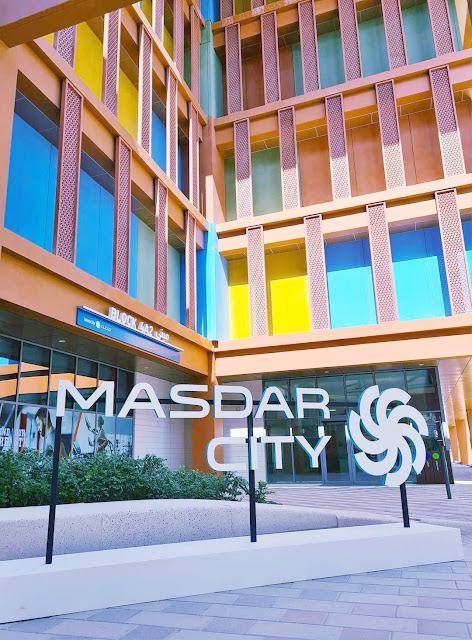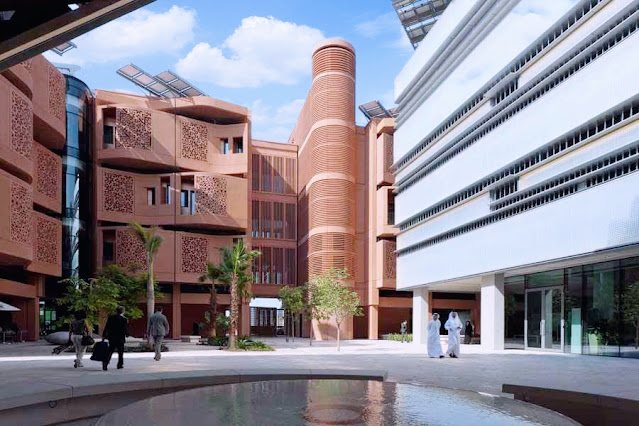Masdar City, one of the world's most sustainable urban communities, is a low-carbon development built by a fast-growing clean-tech cluster. Masdar City is a planned city project in Abu Dhabi, in the United Arab Emirates. The project is led by Masdar, a subsidiary of Mubadala Development Company. Designed by British architectural firm Foster and Partners, the city relies on solar and other renewable energy sources.
Masdar City is one of the highly planned, specialized, research and technologically important municipalities, with a living environment similar to KAUST, Saudi Arabia or Japan's Tsukuba Science City. MasdarCity is being constructed 17 kilometres east-south-east of the city of Abu Dhabi, a five minute drive from Abu Dhabi International Airport and 40 minutes from Dubai. The city will be connected to existing urban areas via roads and light-rail.
Masdar City hosts the headquarters of the International Renewable Energy Agency (IRENA). The city is designed to be a hub for cleantech companies. Its first tenant was the Masdar Institute of Science and Technology, which has been operating in the city since it moved into its campus in September 2010. Construction began on Masdar City in February 2008 and the first six buildings of the city were completed and occupied in October 2010. However, due to the impact of the global financial crisis, the initial 1,000,000 square metres was estimated for completion in 2015 final completion was pushed back to between 2020 and 2025. By 2016, less than 300,000 square metres had been developed and final completion was estimated to be 2030. As of 2020, a 2030 completion date was still projected.
The project is supported by the global conservation charity World Wide Fund for Nature and the sustainability group Bioregional. In 2008, in response to the project's commitment to zero carbon, zero waste and other environmentally friendly goals, WWF and Bioregional endorsed Masdar City as an official One Planet Living Community. Masdar City consists of a tech park built using recycled 40-foot unit shipping containers.
Masdar is powered by a 22-hectare (54-acre) field of 87,777 solar panels with additional panels on roofs. The city has no light switches or water taps; Motion sensors control lighting and water, reducing electricity and water consumption by 51 and 55 percent, respectively.[49] Masdar's original plan called for the entire city to be powered by on-site methods, such as rooftop solar panels, says lead architect Gérard Evenden. He said.
In the initial design, vehicles were prohibited because the public mass transit and personal rapid transit (PRT) systems connecting the existing road and rail lines to other locations outside the city. The absence of motorized vehicles along with Masdar's enclosure, designed to keep out the hot desert winds, allows for narrow, shaded streets, helping cool breezes blow throughout the city. People, goods and supplies will be transported by PRT.
Masdar City intends to incorporate efficient water use into its design. To achieve this objective, Masdar City will recycle water and maximize the use of said water. It will use rainwater harvesting schemes, catch condensate and use acceptable wastewater streams. Mazdar City will try to encourage behavioral changes to conserve drinking water.
Commercial Tenants in Masdar City
Masdar Institute
Masdar Institute of Science and Technology is a graduate-level research university focusing on alternative energy, environmental sustainability and clean technology. Its campus is located in Masdar City. Masdar Institute was the first occupant of Masdar City. The design of the campus emphasizes flexibility, the use of traditional architectural elements and modern materials for an optimized combination of natural lighting and cooling that reduce energy demands.
Masdar Institute plans to eventually enroll 800 students. Admitted students from all countries are offered full tuition scholarships, monthly stipends, travel expenses, laptop computers, textbooks and accommodation to facilitate their studies. Masdar students and faculty are involved in more than 300 joint projects with academia, private enterprises and government agencies. His research focuses on renewable energy, smart grids, smart buildings, energy policy and planning, water consumption, environmental engineering and electronics.
Siemens
A regional headquarters of Siemens has been built in Mazdar City. It is the most energy efficient building in Abu Dhabi. In 2014, more than 800 employees started working there. A LEED Platinum building uses sustainable and energy efficient materials and construction techniques. It is designed to use 45 percent less energy and 50 percent less water than typical office buildings. The Siemens Headquarters received the Best Office Building Award at the 2012 MPIM Architectural Review Future Project Awards. It was named the best and most sustainable office building in the same year by the Middle East Architect Awards. Siemens signed an initial ten-year lease.
The structure includes a highly insulated airtight inner facade that insulates from the sun and a lightweight aluminum shading system on the exterior. The plaza below the building is funnel-shaped. This shape works to draw wind beneath the building. Due to the venturi effect, a breeze flows through the atria in the building structure to the roof of the building, cooling the public spaces without energy costs. These atria allow daylight into the center of the building, reducing the need for artificial lighting and reducing energy consumption. All building automation systems are from Siemens.
Incubator Building
The Incubator Building houses the General Electric Ecomagination Center. The center offers training and exhibitions on energy and water efficiency. This Building includes retail and office space to house start-ups, small-and-medium-sized enterprises, and regional offices for multinationals. The Incubator Building is designed to accommodate roughly fifty companies. The most notable tenants include General Electric, Mitsubishi, Schneider Electric, and the Global Green Growth Institute.
The Catalyst
Masdar City has partnered with oil giant BP to create 'The Catalyst'. This startup will support new and innovative companies that are 1-3 years away from commercialization of their products. As of January 2020, The Catalyst has added three new companies, which they support on multiple fronts. This includes training, mentoring and funding. Catalyst aims to attract companies focused on green technology and accepts applications from local and international businesses and entrepreneurs.






